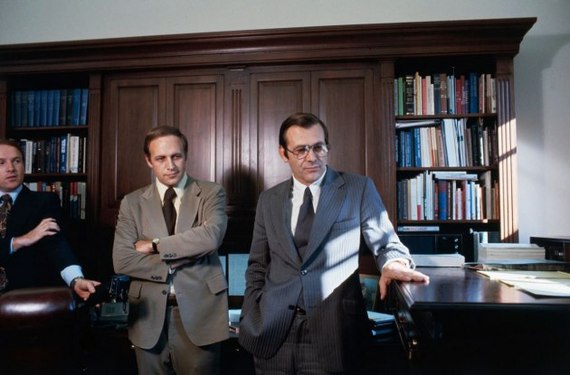We are in the midst of a bumper crop of bio-docs: documentaries focused on single figures who have wound up on the wrong side of history and who seemingly want the chance to get their side of the story on the record.
Obviously, there will be those who disagree with my assessment of the subjects of The World According to Dick Cheney, R.J. Cutler's portrait of the former vice president which played at Sundance at the beginning of the year before it aired on Showtime.
The same folks will no doubt question my inclusion of Donald Rumsfeld on that list (he's the subject of Errol Morris' The Unknown Known, which screened at the Toronto Film Festival in September and which will be released in December). Or Henry Paulson, subject of Joe Berlinger's Hank: 5 Years from the Brink, which aired on Netflix in September. Fewer may have that problem with The Armstrong Lie, Alex Gibney's portrait of Lance Armstrong, which played Toronto and opens in November.
The filmmakers themselves (with the possible exception of Gibney) would no doubt tell you that they don't judge their subjects -- but they wouldn't have made their films if Cheney and Rumsfeld (and Paulson, for that matter) weren't obviously polarizing public figures. Drama comes from conflict, and the divisiveness over key figures in the administration of George W. Bush continues to this day.
So why would figures of such controversy, known for their antipathy toward the press and their controlling natures, sit down in front of the cameras of filmmakers known for, shall we say, provocative and insightful work?
The answer is obvious: So they can have a forum to tell their side of the story, no matter how distorted and self-serving their version may be. It is, after all, almost 40 years since Richard Nixon faced off with David Frost, a watershed moment that backfired on that disgraced president's attempt to burnish his tarnished legacy.
No doubt these particular newsmakers felt they could control the conversation with the filmmaker. If things weren't going their way, they could always take a page from the handbook of the late Robert McNamara, who sat for Morris in the prescient Fog of War, the Oscar-winning doc which predicted the failure of the Iraq war on the eve of that conflict. McNamara said that, when he was asked a question he didn't like, he simply answered the question he wished he'd been asked instead.
This commentary continues on my website.

